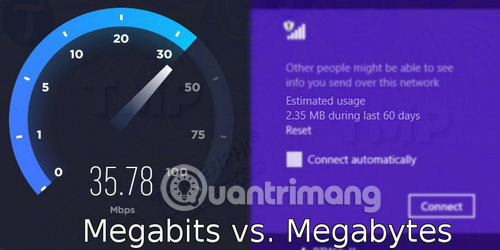What is Megabit (Mb)? Is it the same as Megabyte (MB)?
Megabit (Mb) and megabytes (MB) may sound identical, and even their abbreviations are the same letters, but they are certainly not the same.
It is important to distinguish these two units when you are calculating things like Internet connection speed and the size of a file or hard drive.
If you are checking your Internet connection speed and you say it is 18.20 Mbps, what does that mean? How much is MB? What about a 200 MB flash drive - can you read it to 200 Mb if you want?
Distinguish "b" and "B"
Megabit is expressed as Mb or Mbit when talking about digital storage, or Mbps (megabits per second) when it comes to data transfer speeds. All of this is represented by the usual "b".

For example, your Internet speed is 18.20Mbps, meaning that 18.20 megabit is being transmitted every second. Interestingly, it can be said that the available bandwidth is 2,275 MBps or 2,275 megabytes per second and the values are still the same.
If a file you are downloading weighs 750 MB (megabytes), it will be equivalent to 6000 Mb (megabit).
This is why, and it is very simple.
8 bits in 1 byte
Bit is a binary number or small unit of data on a computer. A bit really, very small - smaller than the size of a character in an email. For simplicity, consider 1 bit equal to the size of a text character. One megabit is about 1 million characters like that.
This is where the 8 bit = 1 byte formula can be used to convert megabit to megabytes and vice versa. In other words, 1 megabit is equal to 1/8 megabyte, or 1 megabyte 8 times 1 megabit.

Because we know that 1 megabyte 8 times a megabit, we can easily find the number of megabytes by multiplying the megabit number by 8.
Here are some simple examples:
- 8 megabit = 1 megabyte (8 Mb = 1 MB)
- 1 megabit = 1/8 megabyte = 0.125 megabytes (1Mb = 1/8 MB = 0.125 M)
Another easy way to remember the difference in size between megabits and megabytes is to just remember that when the units are the same (ie when you compare Mb to Mb or MB to MB), the number of megabit (Mb) is usually bigger (because there are 8 bits in each byte).
However, a super fast way to convert megabit and megabyte is to use Google. Just looking for something like changing 1000 megabit to megabyte, Google will exchange it for you.
Note : Although megabytes are 1 million bytes, usually people will write 8 megabytes instead of 8 million bytes.
Basic measurement units in computers
Why should you know the difference between Mb and MB?
It's important to know the actual megabyte that is different from megabit, especially when you're talking about Internet connection speed, and that's often the only time you see megabit, when it comes to technology-related things.

For example, if you compare Internet speed when purchasing an Internet package from a service provider, you are provided with information that Service A can provide 8 Mbps and Service Z provides 8 MBps.
At first glance, they seem identical and you can choose any cheaper one. However, with the transformation explained above, we know that Service Z is equivalent to 64 Mbps, which is 8 times faster than Service A:
- Service A: 8 Mb / s = 1 MB / sec
- Service Z: 64 Mb / sec = 8 MB / sec
Choosing a cheaper service means you might buy Service A, but if you need faster speeds, you may want to buy a more expensive package. This is why it is important to distinguish MB and Mb.
What about Gigabyte and Terabyte?
Here are some other terms used to describe data storage, but much larger than megabytes. In fact, a megabyte, 8 times the size of a megabit, and 1/1000 gigabyte. So small!
See more:
- Experience the new lag and upload speed feature of FAST.com
- How to calculate network bandwidth and transmission required
- Summary of high speed Leech link site